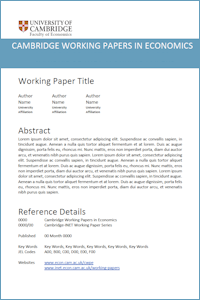
Muza, O. and Debnath, R.
Socially inclusive renewable energy transition in sub-Saharan Africa: A social shaping of technology analysis of appliance uptake in Rwanda
CWPE2055
Abstract: Rural off-grid renewable energy solutions often fail due to uncertainties in household energy demand, insufficient community engagement, inappropriate financial models, policy inconsistency and lack of political will. Social shaping of technology (SST) of specific household electric appliances provides a critical lens of understanding the involved sociotechnical drivers behind these constraints. This study employs an SST lens to investigate appliance uptake drivers in Rwanda using the EICV5 micro dataset, such that these drivers can aid in policy design of a socially inclusive renewable energy transition. The methodology includes a systemic and epistemological review of current literature on the drivers of appliance uptake in the Global South. These drivers were then analysed using binary logistic regression on 14,580 households. Results show that appliance uptake is highly gendered and urban-centric in Rwanda. The type of appliance determines its diffusion across the welfare categories, commonly referred as to Ubudehe categories. Regression results show that mobile phones, radios and TV-sets have a higher likelihood of ownership than welfare appliances (refrigerator and laundry machine) by low-income households. There is also a high likelihood of uptake of power stabilisers in urban-higher income households, indicating poor power quality and distributive injustices. Policy implications were drawn using the lens of disruptive innovation.
Keywords: Energy transition, Off-grid system, Sub-Saharan Africa, Social Shaping of Technology, Gender, Disruptive innovation
JEL Codes: D10 N37 P28 P46 Q40
Author links: Ramit Debnath
PDF: https://www.econ.cam.ac.uk/research-files/repec/cam/pdf/cwpe2055.pdf 
EPRG Paper Link: 2017
Open Access Link: https://doi.org/10.17863/CAM.61860
